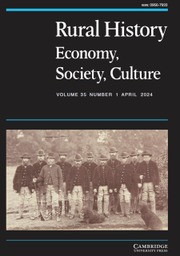No CrossRef data available.
Article contents
Productive practices in Andean rural areas and their relationship to extractive markets (Atacama Desert, northern Chile, 1915–2019)
Published online by Cambridge University Press: 26 July 2023
Abstract
Extractivism has marked the history of Latin America whose operations are in rural territories inhabited mainly by indigenous populations. Mining has had a remarkable expansion in rural territories of the Andes. Critical studies of these processes have focused on the disruptive aspects and conflict between companies, local populations, and States. However, mining has also been intertwined with the territories based on contradictory relationships at different timescales. To examine this issue, we carried out a historical reconstruction of the productive practices of the Caspana community indigenous (northern Chile) and their different forms of connection with mining development. We combine diverse data sources and methodological approaches: oral histories obtained from ethnography, censuses, explorers’ records, and academic literature. We identify different types of relationships over time, according to the different forms of indigenous participation in the extractive markets and the deployment and rearrangement of diverse economic strategies by the indigenous population.
- Type
- Research Article
- Information
- Copyright
- © The Author(s), 2023. Published by Cambridge University Press



